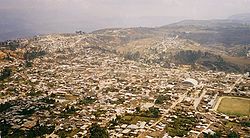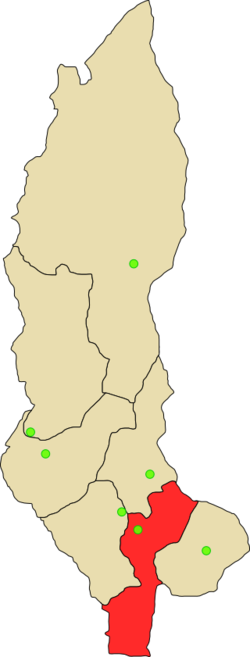Chachapoyas province
Chachapoyas | |
|---|---|
 An air view of the Province of Chachapoyas | |
 Location of Chachapoyas in the Amazonas Region | |
| Country | Peru |
| Region | Amazonas |
| Founded | November 21, 1832 |
| Capital | Chachapoyas |
| Government | |
| • Mayor | Víctor Raúl Culqui Puerta (2019-2022) |
| Area | |
• Total | 3,312.37 km2 (1,278.91 sq mi) |
| Elevation | 2,335 m (7,661 ft) |
| Population | |
• Total | 49,573 |
| • Density | 15/km2 (39/sq mi) |
| UBIGEO | 0101 |
| Website | munichachapoyas.gob.pe |
Chachapoyas is a province of the Amazonas Region, Peru. The province of Chachapoyas was a part of the department of Trujillo (according to the supreme decree of February 12, 1821) being its capital the city of Chachapoyas.
After the department of Amazonas was created, by law of November 21, 1832, it became a province of the Amazonas region, and the city of Chachapoyas remained a regional capital. Its principal quarters are:
- To the north: Luya Urco and Santo Domingo
- To the south: Yanco and La Laguna.

A big part of the province is constituted by soils of puna, located between 4,000 and 5,000 metres (13,000 and 16,000 ft) in the oriental districts of Chiliquín, Quinjalca and Granada.
Two principal rivers cover its territory: the Utcubamba, which runs from south to north and which right margin is dedicated to the agriculture in diverse form; and the Sonche, which runs from east to west and it is born from the meeting of several creeks that go down the heights of Molino Pampa district. This river flows into the Utcubamba along with the Huancachaca. It has a short trip, its beaches are narrow and its areas are unusable because its slopes are rocky and steep.
In Shihual, a Magdalena's district, there are many calcareous caverns, which stalactites and stalagmites formations serve as habitat to diverse night birds.
La Jalca has the privilege of being the first Spanish city that has been founded in the region: in effect, captain Alonso de Alvarado, conqueror of the Amazonas, on September 5, 1538 founded there the first city of San Juan de la Frontera de los Chachapoyas, which then would be moved to the place that it occupies now.

For Peter Lerche, an anthropologist, in la Jalca there is the legitimate Andean pre-Hispanic indigenous Peruvian culture, with traditional towns like Conila, Levanto, Colcamar, Luya. Fruit of his investigations initiated in 1980, he has published "Chachapoyas, travelers' guide". In this book he proposes some tourist circuits. The first one of them, the shortest, can take in average 5 days, and the others, for more adventurous spirits, can take in average 15 days.
Political division
[edit]Chachapoyas is divided into twenty-one districts, which are:
| District | Mayor |
|---|---|
| Asunción | Helda Molinari Trauco |
| Balsas | Eugenio Eslivan Tirado Ortiz |
| Chachapoyas | Víctor Raúl Culqui Puerta |
| Cheto | Elita Culquimboz Huaman |
| Chiliquín | Lazaro Quiroz Chuqui |
| Chuquibamba | Celso Leuman Portal Bustamante |
| Granada | Enoc Pilco Valle |
| Huancas | Asuncion Inga Cruz |
| La Jalca | Jose Tulio Culqui Velasquez |
| Leimebamba | Engels Escobedo Portal |
| Levanto | Rodolfo Inga Huaman |
| Magdalena | Diogenes Humberto Zavaleta Tenorio |
| Mariscal Castilla | Pedro Tuesta Culqui |
| Molinopampa | Zonia Maria Negron Tafur |
| Montevideo | Adalberto Rojas Gutierrez |
| Olleros | Nilcer Vargas Lapiz |
| Quinjalca | Braulio Baldemar Goñas Culqui |
| San Francisco de Daguas | Nelson Ernesto Lopez Portocarrero |
| San Isidro de Maino | Jose Anibal Santillan Vasquez |
| Soloco | Cenovio Loja Culqui |
| Sonche | Segundo Miguel Garcia Alvarado |


